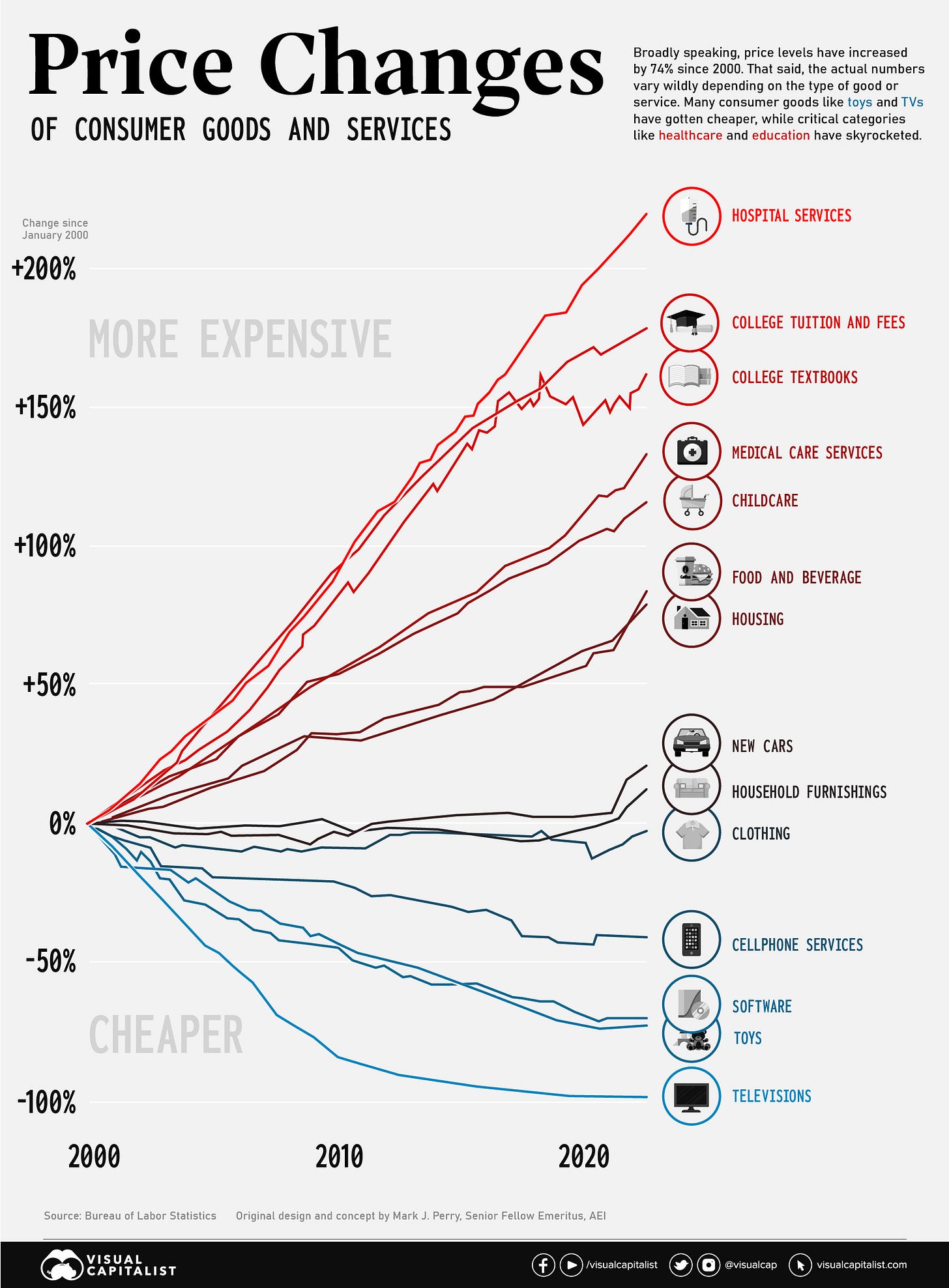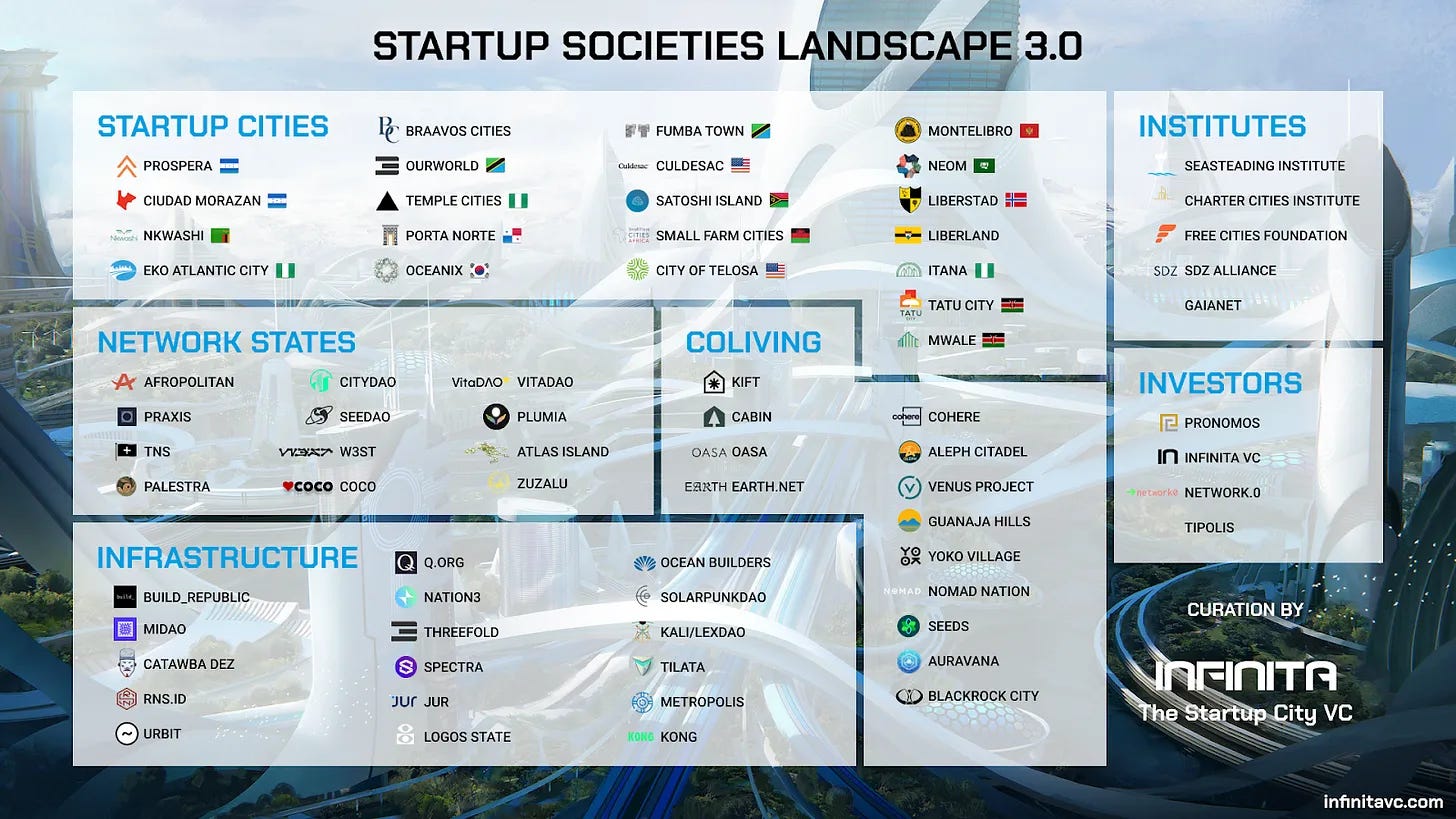Ipê City was born out of a profound frustration with the stagnant and even deteriorating state of Western governance and culture.
State institutions are swiftly declining. Dysfunctional public utilities, growing bureaucracy, escalating human rights violations, infringements on individual rights, infrastructure decay, inflation, and an obsolete monopolistic educational system are just a few examples of this downward trend.
And why have these problems persisted for so long and even worsened? Why have we witnessed several cycles of disruptive innovation in the open economy driven by the digital revolution, while governments and public utilities continue to deteriorate and become prohibitively costly?
This is because the vast majority of public management and societal governance is carried out through monopolistic state institutions.
Although these institutions played a significant role in past centuries, they are now completely outdated structures for the digital age.
The premises on which the nation-state was originally conceived, such as high communication costs, high barriers to mobility, high switching costs, strong citizen ties to geography, and information scarcity, are no longer realities. We live in a real-time connected world with a primarily digital economy. Remote work is on the rise; cultures are being shaped and influenced through the internet; social networks and financial protocols transcend jurisdictions; security is shifting towards cryptography instead of physical enforcement; laws can be enacted using self-executing smart contracts; and various other profound transformations that are incompatible with the assumptions of nation-states.
Hence, the concept of Network States, introduced by Balaji Srinivasan in his book The Network State, are key components of this revolution.
Why?
Because traditional state institutions are monopolies and, as evidence suggests, cannot be reformed. Therefore, the only alternative that can truly bring about significant political change is to emulate the approach of the business world. Start small with a clean slate, innovate radically to address a specific societal problem, and then scale up.
In other words, the startup approach for societies.
Essentially, it is a strategy similar to that adopted by technology startups in recent decades. This strategy has disrupted entire legacy industries, included marginalized people into the economy, and given them a voice. However, this time, startups will not transform an economic sector; instead, they will disrupt the governance stack industry. They will not build software as a service or digital products as a core, but create aligned communities around a moral innovation, build governance as a service and new ways of living and make collective coordination.
If we were able to build giant companies, global social networks, giant open-source protocols, and trillion-dollar cryptocurrencies from scratch in the past decades, why can't we innovate the foundational premises of our cities?
Digital-Native Societies
The concept of a network state is intricate, and any description I provide here will not fully capture the nuances, depth, and ingenuity of the idea.
According to the book, this is the short definition:
A network state is a highly aligned online community with a capacity for collective action that crowdfunds territory around the world and eventually gains diplomatic recognition from pre-existing states.
In simpler terms, this is a strategy that employs digital technologies to create virtual communities highly aligned around a moral or political idea and foster them in person. These communities could encompass a range of ideologies and lifestyles, such as a vegan country, an African nation, a car-free city, or a techno-optimistic society. They also develop the capacity to coordinate and establish their presence in the real world, enabling members to work and live together.
This concept builds upon the achievements of many cultures in past centuries, who could establish entire cities, countries, and states without the assistance of any digital technology. Can you imagine that?
Now, we have access to the Internet, cryptocurrency, mobile technologies, powerful AI, and a robust playbook. Never in human history have we had such a favorable scenario for rethinking and innovating our institutions and social technological structures. This is precisely why a new landscape of startups has emerged and grown rapidly in recent years.
We are approaching a turning point, a moment where we are transitioning from societies and cultures that are strongly tied to geography and political institutions, to intentional communities and internet-native institutions. These new organizations consciously and voluntarily organize themselves with members who share similar worldviews to design new villages or cities, as well as the rules under which they live, using digital technologies as the foundation.
Building a Techno-Optimistic Community
Imagine living and working with people who share the same passion for technology as you do. People who believe in the power of technological innovation and human ingenuity as the main drivers of progress and fairness.
Meet Ipê City, a community focused on building and supporting network societies.
Our goal is to build a network society with crypto governance, and citizens highly aligned around the idea of human progress through technology and freedom.
So, let’s break down the 3 most important layers to turn this into reality: 1. Culture (pro-tech), 2. Technology (digital-native institutions), and 3. Economics.
A Pro-Tech Culture
Wherever we look, we find a cynical, pessimistic culture centered around status, power, politics, and bureaucracy. We witness endless biased attacks on tech companies and entrepreneurs. We notice legacy institutions fighting against innovations, whether they are cryptocurrencies, artificial intelligence, social networks, digital education, autonomous vehicles, or anything that threatens their position of power. We often encounter absurd narratives of degrowth, billionaires shouldn’t exist, anarcho-primitivism, techlash, wokeism, and other authoritarian and anti-progress movements. We see excessive complaints, demands for rights, and protests, but little action toward building a world through innovation and technology to solve global problems.
Such a society is not poised to prosper. A culture that exalts bureaucrats while undermining its innovators will inevitably face a future of scarcity, poverty, and societal turbulence.
This is exactly why we need to radically change the way we tell our stories about technology. That’s why we need to develop and foster a pro-technology society.
But what does being a pro-tech person really mean?
Being pro-technology means understanding that technology is inherent to the essence of humanity. Our biology, this singular machine in the universe, is a direct product of the technologies mastered by our ancestors, such as fire, agriculture, and language.
Being pro-technology means recognizing that the emergence and adoption of concepts such as Human Rights and Democracy were made possible through communication technologies, from the invention of language to computers. It’s acknowledging that when political activists protest for social justice - be it access to education, justice, or security - they are ultimately seeking to provide access to technology for the marginalized. Education relies on books and computers; justice depends on laws, ledgers, and documentation; security encompasses cameras, weapons, and encryption.
Being pro-technology means realizing that the most complex and challenging problems of today, such as climate change and energy scarcity, will not be solved through coercive and intellectually limited political means, but rather through technological innovation. After all, in the face of the population explosion of the last century, what saved us from a massive global famine was not perverse political ideas such as the one-child policy, but rather the Green Revolution.
Being pro-technology means recognizing that the political establishment often engages in zero-sum games and coercion, resulting in severe negative externalities like regulatory capture and wars. Conversely, innovation represents abundance, creativity, and freedom. And while innovations might also introduce unexpected externalities, the overall effect remains undeniably positive, as long as we maintain a free and open environment for developing competitive solutions and accountability.
Embracing technology means aspiring to a future where artists and athletes no longer have to end their careers due to limb amputations, where children can overcome deafness, where blindness is surmountable, and where individuals paralyzed can regain the ability to walk. It’s a future where we can achieve financial, social, and economic inclusion for billions of people in society through the Internet, crypto, and smartphones, and where we can even challenge death itself.
Being pro-tech does not imply indiscriminately embracing every emerging tool. It means understanding tradeoffs and striving for optimalism—discerning what, when, and how much of a technology to use. It also goes beyond merely being a regular user of technology; it’s about developing skills and competence to construct one’s own experiments.
It involves understanding that ancient technologies surround us, even if we may not always recognize them as such. Toilets, beds, slippers, glasses, clothes—everything that surrounds us and greatly improves our lives, though we take them for granted almost as part of nature, were once technological innovations.
Being pro-technology is about leaving the cave and mastering fire. It's about creating ships and sailing into the unknown oceans to discover new lands. It's about creating devices to see the microscopic world and explore the macroscopic universe. And then creating rockets to visit it in person.
Its purpose is to create virtual bridges to overcome harsh realities, allowing everyone to access a more prosperous and abundant world beyond the limits of a single geographical region.
We have mastered agriculture and electricity; built cities; created vaccines, surgeries, cars, and airplanes; gone to the moon; connected the world in an open network; created decentralized digital currencies; artificial intelligence that produces art; and thousands of technologies indistinguishable from magic.
However, regrettably, this vision described is not the one spread by existing power structures and the mainstream media. If we are not aligned on these fundamental assumptions, we will never thrive.
That’s why building a highly-aligned community committed to promoting this vision is the first and most important phase of our project.
So, how do we intend to actualize this?
Talk Meet Work Live
The social layer of IPê City will be established by continuously recruiting and selecting new members who align with our vision and values, and by fostering a cohesive, trustworthy, and productive community. This layer is the most important, and we will initially invest most of our energy here.
Currently, we are in the early stages and are on the lookout for the first 100 founding members.
We recognize that these pioneering members will play a crucial role in molding the community's culture as we expand. Consequently, we are in search of individuals who are truly talented, optimistic, and innovative but also align with our vision and genuinely care about the problems we aim to address.
To become a member, you must be approved in the application process. The objective is to identify whether you align with our values, share our vision for the future, commit to some regular activities, and accept our community guidelines.
This process exists because Ipê City is not a conventional community. It's not a WhatsApp group, a DAO, a think tank, or a political party. Maybe a combination of all of these. Ipê City is a startup society.
To bootstrap and foster this community over the next years, we have a long and still incomplete roadmap. However, all upcoming phases will be connected to these four approaches: Talk, Meet, Work, and Live.
Talk is about connecting and learning online. It’s about creating content and online discussion environments for learning about digital-native societies, governance innovations, cryptocurrencies, AI, biotech, and other emerging technologies.
Meet is where we leave the metaverse and meet in person to build trust. Although digital environments are awesome for breaking physical limitations, it is in person that a real community and a city is built in the long term.
That’s why we’ve been hosting biweekly meetups about Network State since January 2023, after Balaji Srinivasan, the author himself, invited Jean to kick off gatherings here in Brazil. After 20 editions, we evolved from meetups to a startup society.
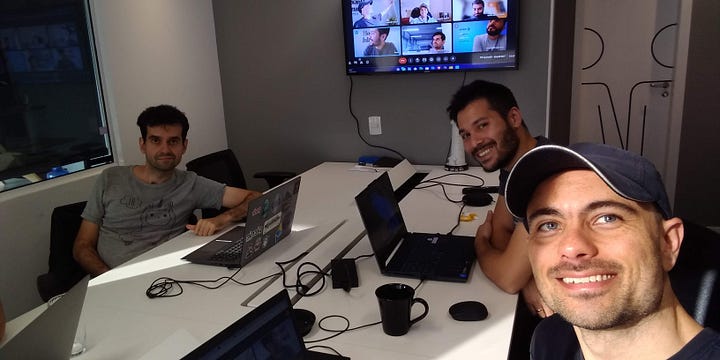
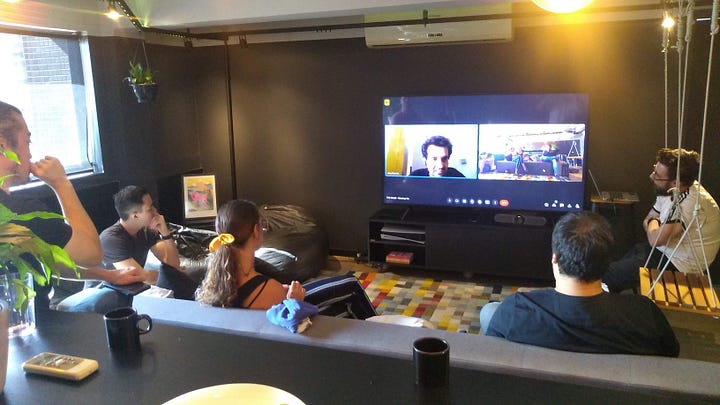
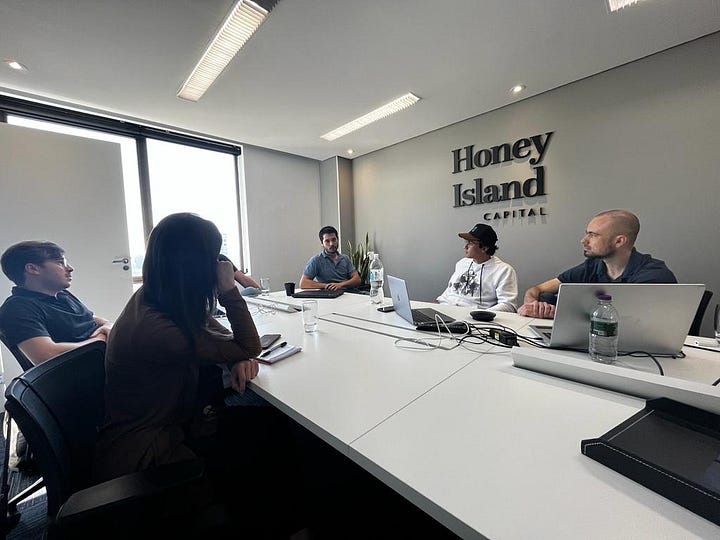
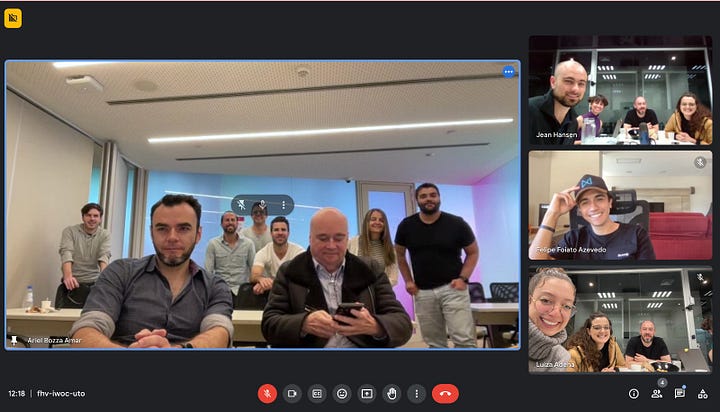
In addition to meetups, we’ll keep organizing events such as conferences (Startup Society Conference), pop-up villages, hackathons, and others. The goal is to facilitate deeper exchanges and develop trust and bonds among members. Essentially, Meet is the phase where we are creating a decentralized network of in-person gatherings worldwide.
Work (+5 years) is about enabling online and in-person environments for developing medium-to-long-term projects that propel the community toward our goal. To achieve this, we will establish a network of physical coworking spaces, offices, and innovative areas exclusively for members to collaborate and work on aligned projects. In other words, we’ll create environments where you won’t need to argue about the benefits of technology or basic freedom.
Live (+10 years) If the community is successful, we can expand it by crowdfunding territories where members can settle and colive using the Ipê City passport. In other words, a network of villages, condominiums, cottages, and small towns worldwide where members can move, stay, and own property. Again, living with people who share a tech-optimistic worldview.
Once the base layer matures, we can leverage it to imagine, build, and invest in governance and innovation in political/social institutions.
Building and Fostering Digital-Native Institutions
Building a community that is rooted in a pro-tech ideology serves a pivotal purpose: to build institutions that are best suited for the 21st century. Without a collective mindset that embraces innovation and progress, and is not hostile to builders, we cannot create new institutions to solve global issues.
After all, you didn't really think that institutions would remain unchanged during the digital revolution, did you?
Of course, not.
Just as tech startups overcame several conventional companies; analog communication was majority replaced by digital platforms; social networks and open protocols deeply impacted mainstream media; ecommerce outgrew physical commerce; and digital money and cryptocurrencies are replacing analog currencies; we can also absolutely expect the foundation of political and civic institutions to be replaced by their digital-native counterparts.
It no longer makes sense to live with notaries, paper-based laws, governments operating trillion-dollar budgets in black boxes, 4-year process voting, homogeneous education, chaotic tax legislation, a lack of basic sanitation, and various problems perpetuated by retrograde political institutions.
But how exactly does this hypothetical future resemble?
Well, can you imagine what a city managed in the style of Apple, Amazon, or SpaceX would look like? Can you wonder how different their services, such as education, taxation, and regulations, would be?
Imagine an open gov platform with endless innovative competing solutions including onchain treasury governance with AI; onchain identity with zero-knowledge proof and self-custody; an open market of educational methodologies including AI tutors for children and in-person activities; laws based on smart contract and opensource tools; as well as innovative physical infrastructure/architecture, and even media, entertainment, and philanthropy solutions connected to the city.
Although we already have very clear signs of this trend of nation-state unbundling in its digital-native counterparts, such as ID, money, finance, property rights, media, and education, this will be a long and steady process that is just getting started.
The same way it would be impossible to predict the number of websites built over the Web or the mobile apps built over Google and Apple app stores, a digital-native city with autonomous jurisdiction could provide solutions we can’t even fathom right now.
After all, this is what startups do best.
These new digital institutions will lead also to several social innovations. The low-bandwidth process of citizen participation through voting every 4 years may have been suitable for the 20th century, but in today’s highly connected world, it makes no sense.
That’s why we will experiment with new decentralized deliberation processes, including PULSE, our concept for collective action. We believe that startups in a competitive environment will come up with numerous solutions, as can already be seen, such as quadratic voting, quadratic funding, and vTaiwan.
Economic Layer
In addition to the social layer (pro-tech culture and collective actions) and the tech layer (digital-native institutions), there is also an economic layer, which involves a business model. Although still in its early stages, we have already determined the direction.
Approved members from the recruitment process will pay an annual fee to access our network. Additionally, aligned brands can support the community through sponsorships and have their brands featured in our events and content.
The revenue will be used to support the core team, leaders, and projects through bounties.
We will explore additional revenue sources for our platform, including monthly fees for potential new services, digital jurisdiction for company incorporation, and sale/rental of real estate and land. These are just a few examples of the numerous opportunities offered by a society's platform.
Additionally, we plan to launch a governance token $IPE. Initially, citizens will receive a token representation for subscribing and collaborating, and they will only play an internal social reputation role in the community.
While we do not have a timeline for creating tokens, when we do, we will maintain it without a liquidity pool indefinitely. Our aim is to use the token within the community's internal ecosystem rather than as a tool for financial speculation.
Our goal is not to attract individuals with short-term mindsets to the project. At the same time, we aim to reward and provide ownership to those who help construct this community in the long run. If before the rise of the Internet and Blockchains the only way to invest directly in a city was buying land, which is not very inclusive, now we can earn and own a piece of the digital infrastructure of the city by collaborating, and be part of the upside and the governance.
How to Become a Member
There are 3 main reasons to become a member:
You are deeply dissatisfied with the political and cultural status quo, have no strong political affiliations, and want to be part of building a prosperous society that is better suited to the digital age.
You want to connect with international leaders and collaborate with optimistic and ambitious individuals such as builders, entrepreneurs, artists, educators, technologists, students, authors, and scientists who are aligned with ideas of freedom and innovation.
You want access to benefits, including event discounts, exclusive content, a network of services, and potentially co-working spaces, housing, physical infrastructure, and access to special jurisdictions to build startups on the frontier.
You envision a future where you live in a modern and digital city, with free access to smart regulations and cutting-edge technology such as life extension, cryptocurrency, and AI. A future where you are not hindered by restrictive laws that impede progress or entrepreneurship.
To become a member of Ipê City you need to apply and be invited by a member. So the easiest path is to read the documentation of the project, build relationships with members on the public WhatsApp group, and attend in-person meetups and online community calls.
Join our Telegram Group.
We are seeking those who also believe in the power of technological innovation and human ingenuity as the main drivers of progress and fairness.
Not only to Live and Let Live, but also to Win and Help Win.


